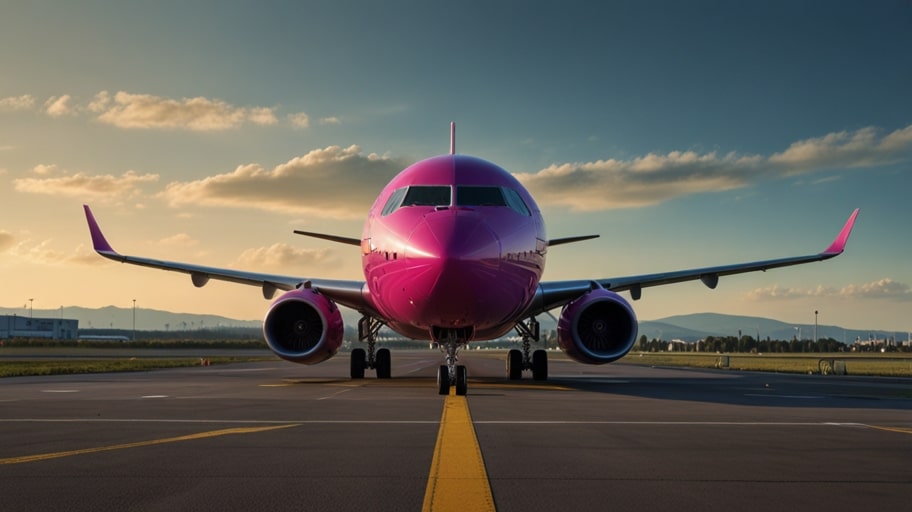Less than 10 days ago, reports surfaced that Wizz Air, a budget airline based in Budapest, had an undersized annual operating profit when compared to what analysts had expected. The airline reported that it couldn’t operate some of its grounded aircraft and also had to pay a lot more for aviation fuel, which pushed its stocks well lower.
Grounded Planes Ground Profits
Engine issues caused many disruptions to the airline’s fleet, and several Airbus A320neo planes were kept grounded for repairs. Wizz Air could not handle as many passengers in the summer because its services were reduced. According to The Wall Street Journal, the low-cost airline sector faces the same problems that have led to reduced profits.
The Hike in Prices Means More Pressure
The rapid increase in fuel prices and labor expenses has squeezed Wizz Air’s profitability. The company’s move to fly to new long-distance spots has increased its operational costs. Even though it always offered low fares, those high costs have affected the carrier’s budget.
Market Reaction and Share Slide
As soon as the markets began, Wizz Air’s stock lost much of its value. The decrease in prices is related to people becoming more concerned about the airline’s handling of a tough economic situation. According to experts, the carrier’s progress depends in the next few months on handling supply chain problems and keeping fuel costs steady.
Ways to Limit Financial Loss
Wizz Air is looking for strategic ways to tackle these difficulties. The airline will improve its route system by focusing on places in Europe with the most significant demand. In addition, it is working to reach new agreements with suppliers to cut down on maintenance costs, but experts say the changes might not appear quickly.
Competitive Landscape Intensifies
Budget airlines deal with lots of pressure, much like Ryanair and EasyJet, which also have similar problems. Being mainly focused on Eastern Europe has given Wizz Air a special place. However, this niche is now threatened by other airlines that provide discounted prices which affects its popularity in leading markets like Poland and Hungary.
The Role of Leadership is Being Examined
József Váradi, Wizz Air’s CEO, is under increased pressure to restore the airline’s profits. While many once praised his aggressive effort to grow the company, people now doubt it as operational challenges increase. Even so, Váradi sees Wizz Air being successful long term in areas where others do not operate; still, these investors are looking for results sooner.
Environmental Concerns Loom Large
Wizz Air is getting attention for its actions towards sustainability. While the airline promised to lower carbon emissions, its old aircraft and costly fuel use raise questions. Environmental groups point out that the carrier is slow to use new eco-friendly technologies, which may harm its reputation.
Factors Affecting the Global Economy
General economic changes are making Wizz Air’s problems worse. Because of inflation in Europe, fewer people are spending on travel and geopolitical issues have led to problems in the availability of fuel. Involving in the unpredictable Eastern European markets introduces more uncertainty to the company’s road to recovery.
Focusing on the Recovery
The company hopes to benefit from a high number of summer travelers. The airline has introduced discounts to encourage more people to book, yet analysts are not convinced. Getting the company back on track requires overcoming challenges in the fleet and dealing with shifting costs, which will test Váradi’s leadership effectiveness.
Investor Confidence Wanes
Wizz Air’s stock has decreased sharply because investors are becoming more cautious about the budget airline industry. Though low costs have supported the company’s prosperity earlier, what it is dealing with now highlights its weak spots. Confidence can only be restored when staff receive clear information and improvements in the company’s work.
Focusing on How Operations Are Carried Out
To tackle the issue of grounded planes, the company is increasing its routine maintenance and considering renting additional planes. These measures aim to increase the number of flights, but engine parts could cause delays in the supply chain. Performing these strategic goals will determine the airline’s success in its recovery.
Customer Loyalty at Risk
The delays caused by a halt in flying and the cancellations have made passengers unhappy and have questioned their loyalty to airlines. To please its customers, the airline has set up compensation schemes and flexible ways to book tickets. Nevertheless, recovering the airline’s reputation will be essential since its competitors will benefit from its current problems.
Introducing Digital Way of Working
Wizz Air is using digital technologies to improve customer service and streamline operations. New features on the mobile app and automated booking systems seek to make things more efficient. Such actions are promising, but they require a big investment at the start, hurting the airline’s budget right now.
Analyst Outlook Remains Cautious
Analysts forecast Wizz Air to face a tough second quarter and may lose up to half of its expected profit. Restoring the fleet and controlling expenses will affect the airline’s future. Though long-term growth is still expected, the main aim at the moment is to stabilize procedures and encourage investors.
A Moment That Can Change Everything
Wizz Air faces an important choice. Flying at a low cost has made the airline successful, yet current issues could challenge its status in Europe. Wizz Air is aiming to get through this difficult time by making adjustments and ensuring its operations are highly efficient.
